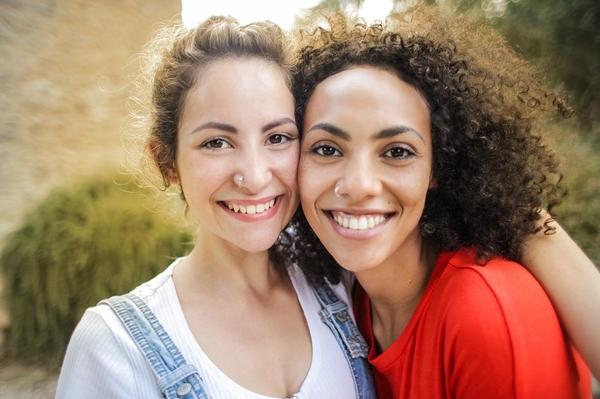I couldn’t unsee it.
We’d just celebrated a diversity milestone as part of our quarterly meeting. It was one of those corporate cheerleading events where I stood in the back resisting the painful urge to roll my eyes.
“We are far more than a team of coworkers,” the CEO said, gesturing wide with his arms to the crowd, “We are a family.”
He was such a phony. The summit concluded and I went to the lunchroom. Right as I walked in, I stopped in the doorway and noticed something obvious that I hadn’t noticed before this diversity meeting.
All the white people were at their tables. All the black employees sat at another set of tables. Three Asian ladies sat at another. It was like we were living in the 1950s. And it wasn’t confined to this office. I still see this trend so often when I walk through malls, or along the sidewalk.
A similar phenomenon was observed on the set of Planet Of The Apes in 1968. The director noticed that during lunch, the people dressed as gorillas sat with other gorillas, chimps with chimps, and humans with humans. He described feeling a chill in the air and wondered if we were already in a dystopian sci-fi future. It even happened on the set of Babylon 5. People self-segregated according to their alien skin color.
This trend has long predated echo chambers, and it’s detrimental to your growth.

The closed network problem
The trend is called homophily, where we magnetize towards clusters of people similar to us. Race isn’t the only sorting mechanism. People sort by social class, age, political ideology, and even the type of music they listen to. And the unfortunate result is that we often live in a “closed network”. We sort ourselves into increasingly tight homogeneous groups.
A closed network forms in these four steps and I suspect you’ll be able to think of a few examples as you read this (I certainly did):

Putting all moral platitudes aside, social diversity has great predictive qualities for your career and life.
Count on one hand your closest friends. I’d bet that for many of you — they are pretty similar to you across a few demographic touchpoints. It’s no fault to you. This happens naturally, but you can disrupt this habit.
By mixing up your friend group, you are exposed to ideas different than your own and stretch your thinking. Your professional network also becomes much more potent, which is especially important: Within 10 years of graduation, a majority of people won’t work in the area they majored in.
Beware of gatekeeping your network
My ex’s family was deeply conservative — which is fine on its own. People are entitled to their beliefs. But this was often a barrier to who could spend time with them.
They were constantly sizing people up and figuring out their political opinions to determine if they were friend-material. Many people do this without realizing it. These parents were just explicit about it and they had a very small town syndrome (cliquey behavior, when you forget there is an entire world outside of your own).
This introduces the other pesky problem. It’s not all that easy to make friends — especially as we get older. So what next? There are a few solutions.
A route out of Cloneville
I moved 15 times before I turned 18. I lived in California, DC, Florida, Virginia Beach, North Carolina — and every new batch of people was so different than the next. I went to an all white, deeply conservative private school in 9th grade, a liberal high school in Coronado. I was one of the only white kids at an inner city middle school in DC. It wasn’t always easy.
Every summer, I waited for the talk. My mom or dad would come to my bedroom and tell me we were moving and how I was going to love this new school and place. Early on, I realized implicitly, “OK. I need to learn to make new friends.”
I was a new 5th grader at Linkhorn Elementary. We had a substitute teacher who happened to be gorgeous. She was passing out quiz papers. Before she passed out each quiz, she did that thing where she licked her finger to grip the paper.
After she handed me my quiz, I looked across the table at a classmate Joe and say, “Hey Joe! Pssst.”
He turned to me and I pretended to lick my finger and put it down to my thigh and made a hissing sound, like bacon hitting the frying pan. It was a corny joke — but it made Joe laugh and we were instantly friends. And from there, I learned that humor was one quick path to win anyone over.
Often, it’s less about how funny a joke is — and more about the energy it establishes. It signals, “I want to play.” Think about how a dog plants his chest down to the ground while keeping his hind legs standing to get another dog to play with him. This is the human equivalent.
It says, “I like you. Let’s have fun.”
“What if I’m not that funny?”
An even better solution that is painfully overlooked is to smile. Researchers have proven that smiles motivate people to interact with you. They are seen as a “prosocial invitation”. Stand upright and give them a quick, natural smile right when you spot them. It signals you are excited to see them.
After getting to know so many types of people, I’ve realized most people just want to be accepted as a complicated human being. And if you are just nice to them, and seem happy to see them and talk to them — you’ve nearly won the battle already.
When you go to your lunchroom, consider sitting with a new group of people. Don’t be afraid to talk to someone who looks different than you.
There’s a concept called contact hypothesis whereby tension between groups is reduced when they are brought together and interact. It promotes trust and reduces stereotyping. It reminds two different people that they’re both human beings. But the only way to make different types of friends is to actually spend time with people who are different from you.
One of my close friends couldn’t be more different from me. His political views and background are a full 180. But we are both fully candid about our opinions and thoughts, and know we can do so without fear of judgement or being disliked. Sure, he says crazy stuff sometimes but that’s fine. He’s still my friend. He’s taught me a few things about the world and changed a few of my opinions, and I’d like to think the reverse is true.
My hope, is that in a world that is so divided, more people from different walks of life can share the same path. They’d expand their own perspectives. They’d have more love and understanding, and more career opportunities.
And it would save us from being fenced in with our own. Closed networks beget closed minds.


No comments yet, come on and post~